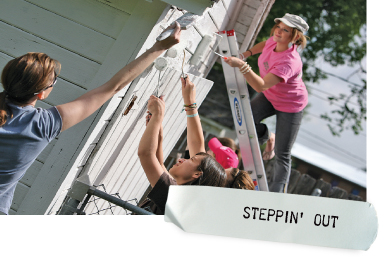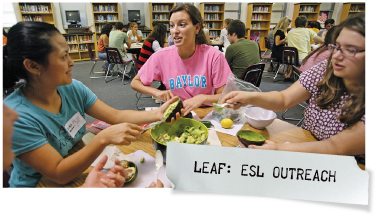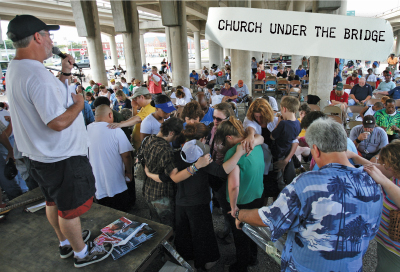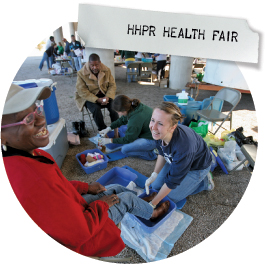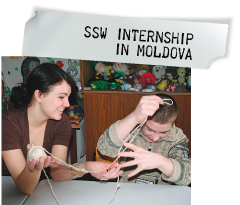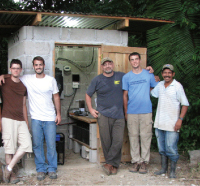Engaging Poverty: Profiles
It just takes ONE
After reading Bill Hybel's Holy Discontent as a sophomore, Justin Kralemann realized what discontented him most: extreme poverty. Two years later, Kralemann is finishing his first year as president of ONE Campaign at Baylor.
Throughout the school year, Baylor participated in the ONE Campus Challenge, a nationwide effort on U.S. college campuses to raise awareness about global issues, end extreme poverty and help eradicate preventable diseases. At the end of the challenge, where points are accumulated based on various activities, Baylor placed in the top ten out of more than 2,400 schools. Not bad for the organization's first year on campus.
"We Baylor students have taken the challenge to not only focus on the global poverty issues, but to address what is happening here in Waco," says Kralemann.
See the project video "One Baylor, One Waco, One World" on YouTube.com
Right foot forward
Matt Schnarr knew this year was the perfect time to take Steppin' Out further than it had gone before. He thought Baylor's best-known service tradition needed a renewed sense of purpose.
"Steppin' Out had become not exactly what it was intended to be, which was a stepping stone for students to get involved in service, not a one-time service day and be done," says the Conway, Ark., senior. "It was intended to be something where students can get a taste of what service is and keep going from there."
"The evolution that we've seen this year in Steppin' Out, is that it's no longer just about putting students in the community for half a day of service," says Karen Klinger, MSED '05, associate director of Student Activities."There's been a real effort and desire to bring in that educational component and to make it a deeper experience rather than just going out and painting a house. Why are you painting that house? Why is that a significant contribution of your time and energy? We're helping students connect those dots."
During the school year, Schnarr says Steppin' Out's leaders helped to disseminate information about poverty in Waco all over campus. Then 3,000 students ventured out to 80 service sites on April 4, with some groups returned to the same streets where they had already established relationships from previous service projects. Instead of hosting the traditional block party on campus as in previous years, more than 1,000 students and community members celebrated together at a city park in a low-income neighborhood.
Undoubtedly for many, this year's Steppin' Out really was a stepping stone, and they'll keep putting one foot in front of the other, perhaps on a block they've been down before.
Global Poverty ELG
Approximately 40 freshmen will take part in the Global Poverty Engaged Learning Group (ELG), one of five ELGs beginning this fall. ELGs are coordinated efforts to engage students with similar intellectual and research interests to explore a challenging issue from disciplinary and/or interdisciplinary perspectives in one-hour seminars for three to four semesters. Students will explore the causes of, and possible solutions to, global poverty from a variety of perspectives, including theological, political, economic and technological. Students will learn how the church, business and engineering can work together to help alleviate poverty in underdeveloped regions of the world. During the fourth semester, students will be involved in a research and implementation project that will benefit a poor community.
Dr. William Jordan (mechanical engineering) will direct the ELG, along with faculty partners Dr. Walter Bradley (mechanical engineering), Dr. Jimmy Dorrell (Mission Waco & Truett Seminary), BA '72, MA '93, Dr. Joe McKinney (economics), Dr. Mitchell Neubert (entrepreneurship) and Dr. Steven Bradley (entrepreneurship).
Texas Hunger Initiative
Jeremy Everett, MDiv '01, joined the Baylor Center for Family and Community Ministries (CFCM) within the School of Social Work in February to direct the Texas Hunger Initiative, a new project to alleviate hunger in the state that is being sponsored jointly by CFCM and the Christian Life Commission.
The Texas Hunger Initiative project comes alongside hunger ministries related to the Texas Baptist Offering for World Hunger coordinated through the Baptist General Convention of Texas, which currently provides $475,000 for 95 Texas hunger ministries. Initially, the project will identify regional leaders in the state and create networks that lead to increased capacity for those ministries that are addressing hunger
"With some organization and creativity, hunger in Texas can be alleviated, and I think we'll be well on our way to that within six years," Everett says.
Learning English Among Friends
Nationally recognized Learning English Among Friends (LEAF) started in 2003 in Waco-area schools to help Hispanic students and their families hone language skills through ESL classes. The outreach integrates parent education, child education and interactive parent-child activities. LEAF holds classes in local schools and on campus as well.
This year, 40 Baylor students in the Hispanic Families in Transition Engaged Learning Group have tutored families in area schools. In addition, 27 Baylor students tutored 15-20 Baylor housekeeping staff, who still receive pay while attending class, says junior Gina Gollub, who serves as the student director of LEAF at Baylor through Student Government.
"LEAF is a wonderful way for Baylor's students and housekeepers to benefit from getting to know each other," says Gollub. "What I have continued to observe year after year is the strong relationships that develop between tutors and their students."
Dr. Randy Wood, BA '70, PhD '78, School of Education professor and overall director of the LEAF program, is working on developing resources for other communities to start and maintain their own LEAF classes.
Soon, local businesses will begin sending their employees to LEAF classes at the schools, says Wood. By partnering with Waco and La Vega ISDs, GEAR UP Waco and AVANCE of Waco, LEAF continues to make a lasting impact.
World Hunger Relief, Inc.
Chartered in 1976, World Hunger Relief, Inc. participates in all sorts of local and international sustainable development programs. Students, alumni and professors alike work and volunteer at this Christian organization that equips individuals to help communities develop sustainable farming techniques. About seven miles from campus, the 40-acre farm offers a variety of educational and practical opportunities for the local community, including tours, urban gardening initiatives, workshops, and a global poverty simulation program.
Matt Hess, BSED '02, is in his fourth year as education director at the farm after serving as a long-time volunteer. Hess says in the years he's been at the farm, he's observed more Baylor involvement.
In addition to student organizations volunteering to help out at the farm, Engineers with a Mission are working on wind energy generation and solar panels for the facility. Assistant professor of biology Dr. Bryan Gibbon is working with high-protein corn, and several recent Baylor alumni serve as live-in volunteers and interns. Some students work at the village store, which sells fair trade merchandise as well as vegetables, milk, eggs and meat from the farm.
"We have a growing partnership [with Baylor]," says Hess. "We've found more and more meaningful ways to work together."
Mission Waco
"[Our students'] growing passion has a lot to do with long-term partners in the community, like Jimmy Dorrell. His affiliation with Baylor and his connection to a huge group of students here every year has driven some of that grassroots effort to connect to the community," says Karin Klinger, MSED '05, associate director of Student Activities.
Mission Waco's Executive Director since 1982, Dr. Jimmy Dorrell, BA '72, MS '93, is a dedicated friend of the poor. Baylor students flock to serve in his interdenominational ministry's numerous relationship-based, holistic programs.
"Baylor students are great, and I compliment this campus because there has been a major shift--in one month alone Mission Waco had 350 volunteers, and probably two-thirds of them were Baylor students," says Dorrell, who also teaches at Baylor's George W. Truett Seminary. He estimates students recorded at least 10,000 service hours last year at Mission Waco and Church Under the Bridge, where Dorrell serves as pastor.
Making work pay
President of Students for Social Justice (SSJ), Alex Schmidt has been working diligently for two years keeping the student body informed about living wage efforts on campus. The main goal of the 1 John 3 Campaign, also known as the Baylor Living Wage Movement, is to increase the minimum pay for permanent service workers: housekeeping, maintenance and dining staff.
"Sometimes students or faculty walk past and take for granted the service that these workers do and that they are part of the Baylor family, too," says Schmidt, an Arlington junior. "We want to increase their benefits so they can have a better quality of life for their families as well."
The SSJ has been advocating a living wage for campus workers since 2003-04. Baylor's administration established the Adequate Wage Task Force in 2005; after an in-depth study, it recommended that the pay rate increase in steps over a four-year period.
"For Baylor to be out on the front end of the living wage issue is important," says Dr. Jerry Waltman, the R.W. Morrison Professor of Political Science and author of three books on living wage. "It's part of our Christian commitment; how we treat each other is really a measure of who we are."
"Students created, organized, and maintained the living wage campaign on this campus," says Dr. Jon Singletary, BA '93, director of the Center for Family and Community Ministries. "When our administration announced that Baylor had taken this first step to move towards what was a living wage that was above the newly mandated minimum wage at the back-to-school faculty meeting [in Fall 2008], the faculty responded with thunderous applause.
"We've made some changes, but there's more to be done. I'll say more broadly that that effort is reflective of other things that I do believe are happening because so many of us do value and want to give life to that value, of what it means to be a Christian university."
Bridging the gap in health care beneath I-35
Human Health and Perfomance professor and director of the undergraduate community health program, Dr. Beth Lanning and her students have collaborated with Mission Waco and Church Under the Bridge to do a Health Fair for the homeless and underserved every fall and spring over the past four years. The students serve anywhere between 56 and 140 individuals.
At the April 5 Health Fair, Lanning and her students worked with vendors from the community who wanted to help by taking blood pressure and glucose readings, addressing dental care, and giving out reading glasses and hygiene gift bags.
"We do it right under the I-35 bridge before the church service starts," Lanning says. "We also have a foot-washing area to take care of their feet, and we talk about nutrition and hydration and other services they might need."
Later, the class tries to do a follow-up with each person.
"We gather their information and give it to Potter's Vessel and Mission Waco to connect them to services they need and remind them about the Meyer Clinic for low-income individuals."
At Baylor since 1993, Lanning emphasizes to students to take time to listen.
"Each person has a face and a story. What [the students] find is, it's kind of humbling. Some are very educated people. Some have made some bad choices or had some issues, especially [veterans]."
Serving in Europe's poorest nation
To help improve the social infrastructure in Europe's poorest nation, three graduate students traveled this spring to Moldova for a three-month trip, the School of Social Work's first international internship. BIPI-provided funds supplied the women with a translator and room at an International Mission Board house. Megan Nichols, BSW '08, Joy Pfanner, BSW '08, and Leah Smith, BSW '08, found the situation grim. The trio worked to improve the area's collapsed social infrastructure by addressing the basic needs of families, orphans and the deaf population.
In the city of Chisinau, the students worked with Children's Emergency Relief International, doing case management for a family consisting of a mother with cancer and a child with severe physical and mental disabilities in a country where very few can afford healthcare.
The group also worked with Moldova Christian Aid on a multimillion-dollar proposal for a social development project in the village of Biesti. Nichols says most lodgings there have no gas, water, or plumbing. One-quarter of the children there have been abandoned by parents who have left the country to find work, which contributes to Moldova's alarming rate of child trafficking, the highest in Europe.
On the internship's blog, moldovamsw.blogspot.com, Nichols says the trip was "precious, life changing, difficult and thought-provoking... four words to describe every day of my experience in Moldova. I am different because of what I've seen."
The Village electric
Brian Thomas is searching for the best ways to bring financially sustainable energy businesses to remote, rural and impoverished communities in the developing world.
"We have built a few prototype systems in rural Honduras that use hydropower to run generators that create electricity," says Thomas, a senior lecturer in the Electrical and Computer Engineering Department. "Then we built a delivery network of power lines to bring the electricity to individual homes and small businesses in these rural villages."
This summer, Thomas, a BIPI grant recipient, will return to Honduras with 10 undergraduates to expand and upgrade the prototype hydropower energy businesses there. The group will be repairing a flood-damaged system, installing a new type of electronically resetting circuit breaker to help control usage and protect the users, and building a distribution grid in a new village.
"The grid will consist of power lines, mounted on homemade power poles made from the Madreado tree. Once a branch is cut and planted in the ground as a power pole, it takes root and starts growing a new tree!"
Thomas is faculty sponsor of the student organization Engineers with a Mission, which aims to promote technologies for the poor in the developing world. The group takes trips every year to places like Honduras, Kenya and Rwanda to use its members' engineering skills to help the poor. These efforts also help fulfill Baylor 2012's goal of expanding international opportunities for students and faculty.
"We have deployed solar panels in orphanages, water purification systems in villages, and helped with the design of pedestrian bridges," says Thomas.
Some of Thomas' students, such as Leah Richter, BSECE '07, take what they've learned at Baylor and continue to help the poor after graduation.
"Leah has grown Engineers with a Mission into a 501(c)3 non-profit organization called Global Appropriate Technology Ministries," says Thomas. "Their purpose is to be a bridging network between engineers who want to serve in the developing world, and missions communities that need engineering help."
Thomas is also starting Village Energy Inc., a for-profit company to deploy village-level electricity franchises in Honduras. December graduate Ryan McGhee, MBA/ME '08, is working with Thomas as chief mechanical engineer for the company.
